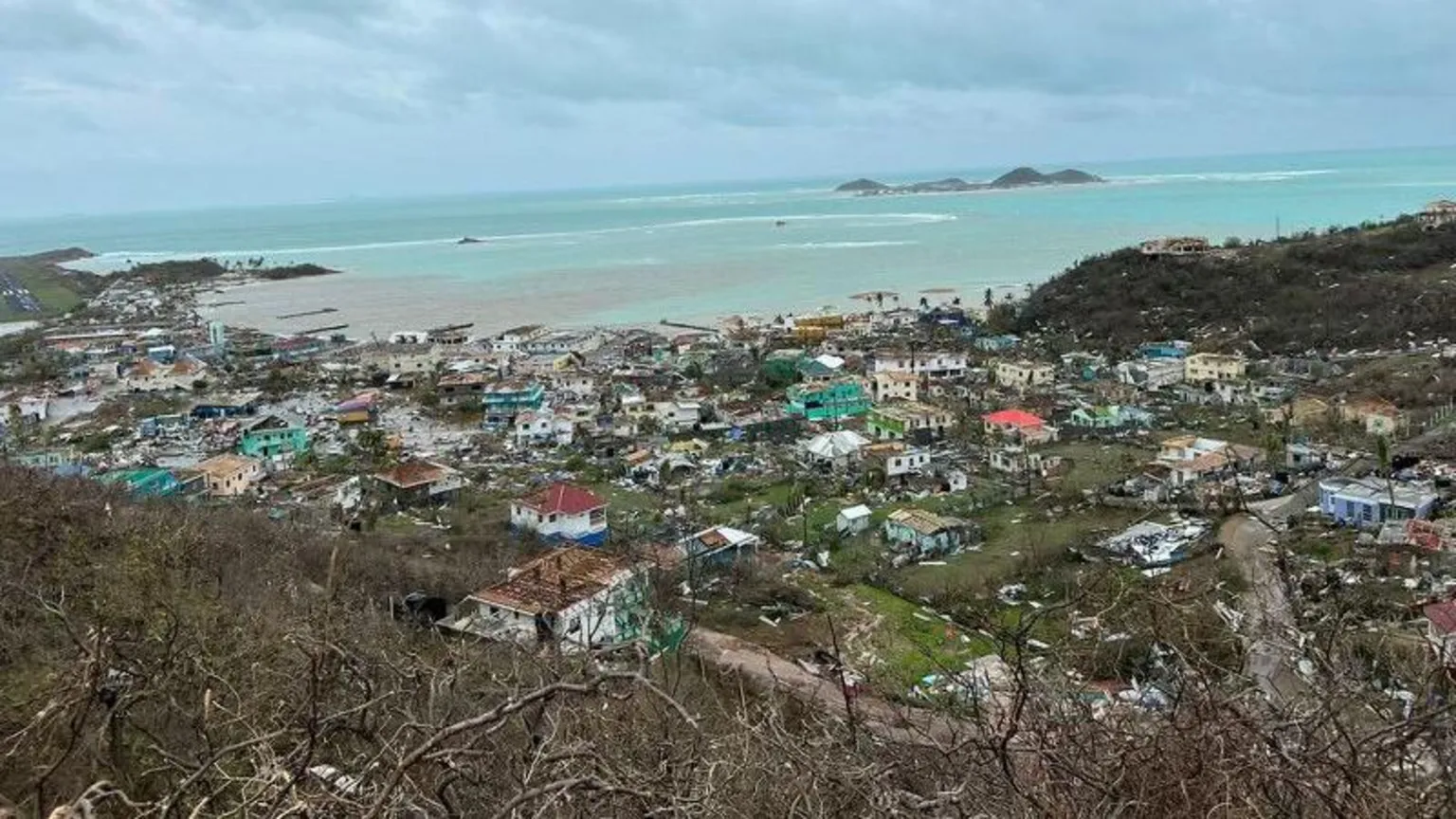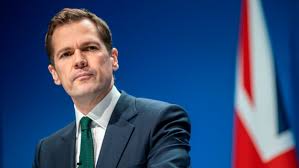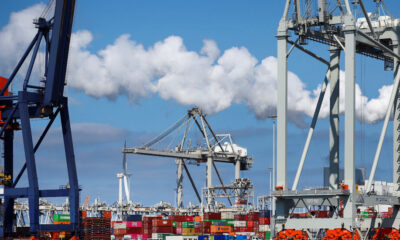News
“Almost Whole Island Homeless” After Hurricane Beryl

Union Island, St Vincent and the Grenadines – July 2, 2024 – Hurricane Beryl has left Union Island in ruins, with nearly all residents now homeless. The storm destroyed most buildings and critical infrastructure, leaving the island in a dire state.
Devastation and Desperation: Katrina Coy, a local resident, described the aftermath: “Union Island is in a terrible state after Beryl passed. Almost the whole island is homeless. Houses are flattened, roads blocked, and electricity poles are down.”
Sebastien Sailly, a fisherman, echoed her sentiments: “Everything is lost. I have nowhere to live right now. Ninety percent of the island – easily 90% – has been erased.” Having lived through Hurricane Ivan in 2004, he noted that Beryl’s destruction was on another level.
Alizee Sailly, who runs a family hotel, recounted the harrowing experience as the hurricane passed: “We had to push furniture against doors and windows to keep the winds from blowing them open. The pressure was so intense you felt it in your ears. Roofs and windows were breaking, flooding was everywhere.” The trauma from the event is still fresh, with many residents feeling overwhelmed by the extent of the damage.
Immediate Needs: The community’s immediate priorities are shelter, food, and water. Residents are trying to gather materials for temporary shelters. “Finding water and food is going to be tough,” said Sebastien. He has also lost his two farms and beehives, adding to the personal toll of the disaster.
Alizee emphasized the urgent need for tinned foods, powdered milk, sanitary products, first-aid kits, tents, and generators. She has been communicating via SpaceX’s Starlink network due to downed power and communications.
Government Response: Prime Minister Ralph Gonsalves acknowledged the immense destruction in a morning address: “Hurricane Beryl has left in its wake immense destruction, pain, and suffering across our nation.” He promised swift action to tackle the post-hurricane priorities, but residents are sceptical about the government’s capacity to respond effectively.
Sebastien hopes for military and coastguard assistance. “This is going to take billions; it will take a year or more and is going to need international help,” he said. The community remains uncertain about the government’s ability to provide the necessary resources and manpower for recovery.
Call for Help: Katrina Coy, director of the Union Island Environmental Alliance, called for immediate assistance from the Caribbean diaspora. “We’re in dire need of help. Emergency kits, food, evacuation – all of that is needed now.” Her work on water security, vital for small island communities, has also been devastated by the hurricane.
Hurricane Beryl’s Impact: Beryl hit land as a category four hurricane with 150 mph (240 km/h) winds. Thousands remain without power and many are in temporary shelters across St Vincent and the Grenadines, Grenada, and St Lucia.
Despite the devastation, Sebastien expressed gratitude: “The most important thing is that we are still alive, not the material losses. I was just pleased to see my neighbours were still here.”
News
Europe to suspend approval of US tariffs deal

The European Parliament is preparing to temporarily suspend its approval process for the US tariffs agreement reached in July, according to sources familiar with discussions within its international trade committee.
The expected announcement, scheduled for Wednesday in Strasbourg, France, would signal a further intensification of transatlantic negotiations at a time when political and economic sensitivities are running high. While the move introduces uncertainty, European officials have framed it as a procedural step that keeps dialogue open rather than closing the door on cooperation.
The development comes against the backdrop of renewed political friction, as US President Donald Trump has escalated rhetoric over Greenland, warning over the weekend that additional tariffs could follow if US interests are not addressed. Despite the sharper tone, European diplomats continue to emphasise that engagement remains the preferred path forward.
Global financial markets have responded cautiously, reflecting heightened awareness of the potential for renewed trade disputes, but also the expectation that both sides have incentives to avoid a prolonged confrontation. European stock markets recorded a second consecutive day of declines on Tuesday, while US equities also eased. The Dow Jones Industrial Average fell 1.3% in midday trading, the S&P 500 slipped 1.5%, and the Nasdaq was down 1.7%.
Currency markets mirrored the shift in sentiment. The US dollar weakened notably, allowing the euro to rise 0.7% to $1.1731, while sterling gained 0.2% to trade at $1.346. Analysts noted that such movements often reflect short-term reassessments rather than long-term expectations.
Bond markets also saw increased activity, with borrowing costs rising globally as investors adjusted positions. Yields on 30-year government bonds climbed in major economies including the United States, the United Kingdom and Germany, marking the most significant sell-off in long-term debt for several months.
Until recently, trade relations between Washington and Brussels had shown signs of stabilisation following the July agreement reached at President Trump’s Turnberry golf course in Scotland. Under that deal, US tariffs on European goods were set at 15%, a notable reduction from the 30% initially threatened during April’s “Liberation Day” tariff announcements.
In return, the European Union committed to increased investment in the United States and to regulatory and structural adjustments within Europe aimed at supporting stronger US export growth. Officials on both sides had presented the arrangement as a balanced compromise designed to restore predictability to transatlantic trade.
News
Syria strikes new ceasefire deal with SDF

The Syrian government has announced an immediate nationwide ceasefire with the Kurdish-led Syrian Democratic Forces (SDF), a move that Syrian state media says effectively consolidates state authority across almost the entire country and brings an end to nearly two weeks of clashes.
The ceasefire is anchored in a comprehensive 14-point agreement that provides for the gradual integration of the SDF into Syria’s military and state institutions. Officials in Damascus described the accord as a major step toward restoring national unity after years of fragmentation brought on by the civil war.
Speaking in the capital, President Ahmed al-Sharaa said the agreement would enable Syrian state institutions to reassert formal control over three key eastern and northern governorates: al-Hasakah, Deir Ezzor and Raqqa. He emphasised that the deal creates a framework for stability, governance and security to return under a single national authority.
The announcement followed high-level talks in Damascus between President al-Sharaa and the US special envoy to Syria, Tom Barrack. Barrack welcomed the ceasefire and broader agreement, describing it as an important step toward a “unified Syria” and a reduction in long-running internal tensions.
SDF commander Mazloum Abdi was expected to attend the meeting in Damascus but was unable to travel due to adverse weather conditions. His visit has been rescheduled for Monday, according to President al-Sharaa, underscoring continued engagement between both sides as the agreement moves toward implementation.
Kurdish-led forces established their autonomous administration in northern and eastern Syria nearly a decade ago, during the height of the country’s civil war. The SDF received strong backing from the United States, which armed and trained the group as its primary local partner in the campaign against the Islamic State group (IS).
With sustained US military support, the SDF succeeded in driving IS from large parts of northeastern Syria and subsequently governed a mix of Kurdish- and Arab-majority areas, developing parallel civilian and security institutions during years of conflict.
Under the new agreement, Syrian authorities will assume control of civilian institutions, border crossings, and strategic oil and gas fields that have long underpinned Kurdish self-rule. These measures are intended to bring economic assets and administrative systems back under central state management.
The deal also outlines the integration of SDF military and security personnel into Syria’s defence and interior ministries, subject to a vetting process. In addition, Damascus will take over responsibility for prisons and detention camps holding tens of thousands of foreign IS fighters and their families, a move officials say will strengthen national oversight and long-term security arrangements.
News
Machado vows to lead Venezuela ‘when right time comes

Venezuelan opposition leader María Corina Machado has reaffirmed her intention to lead the country, declaring that she will assume the presidency “when the right time comes,” as Venezuela navigates a critical political transition.
Speaking in an interview with Fox News during a visit to Washington, Machado said she believes she will one day be elected president, describing her ambition as part of a broader mission to rebuild the country. She said her goal is to help turn Venezuela into “that land of grace,” adding that she hopes to become the nation’s first woman president when conditions allow for a democratic transfer of power.
Machado’s remarks came a day after she presented her Nobel Peace Prize medal to US President Donald Trump, describing the gesture as recognition of what she called his commitment to Venezuela’s freedom and democratic future. The symbolic act drew international attention and underscored her effort to strengthen ties with key global actors at a moment of heightened uncertainty for the South American nation.
The political landscape in Venezuela has shifted dramatically following the US operation on 3 January that led to the seizure of President Nicolás Maduro in Caracas and his transfer to New York, where he is facing multiple charges related to drugs and weapons trafficking. The move has intensified diplomatic activity around Venezuela’s future governance and raised questions about who will ultimately lead the country through its next phase.
Despite Machado’s prominence within the opposition and her movement’s claim of victory in the widely disputed 2024 elections, President Trump has so far stopped short of formally endorsing her as Venezuela’s next leader. He has argued that she lacks sufficient domestic backing at this stage. Instead, the US administration has been engaging with interim president Delcy Rodríguez, who previously served as Maduro’s vice-president and is currently overseeing the transitional administration.
Addressing questions about her role, Machado stressed that she remains focused on serving Venezuela in the most effective way possible. “I want to serve my country where I am more useful,” she said, adding that she believes she has a clear mandate from supporters who see her as a central figure in the country’s democratic aspirations.
During her visit to Washington, Machado also met with several US senators as part of broader efforts to rally international support. Outside Congress, her brief comments to reporters were frequently interrupted by supporters chanting “María, presidente” while waving Venezuelan flags, reflecting the enthusiasm of her backers and the continued visibility of her leadership bid.
-

 Sports7 days ago
Sports7 days agoMane’s Decisive Strike Sends Senegal into Another AFCON Final as Egypt Exit
-

 Sports1 week ago
Sports1 week agoCarrick Returns to Steady Manchester United as Caretaker Head Coach
-

 News1 week ago
News1 week agoTrump tells Iranians to keep protesting, says help is on its way.
-

 News1 week ago
News1 week agoAt least 28 killed after crane collapses on train in Thailand
-

 News6 days ago
News6 days agoIran Judiciary Rejects Execution Claims as Officials Signal Easing of Tensions Over Protest Arrests
-

 Sports6 days ago
Sports6 days agoEto’o handed ban for misconduct at Afcon
-

 Tech6 days ago
Tech6 days agoX to stop Grok AI from undressing images of real people
-

 News6 days ago
News6 days agoRobert Jenrick sacked by Tories for plotting to defect


















